
-
 History of Religions
History of the 3 Monotheistic religions (Judaism, Christianity and Islam) and of the main different Christianity confessions (Roman Catholicism, Eastern Catholicism and Eastern Orthodoxy, Anglicanism and Protestantism)
History of Religions
History of the 3 Monotheistic religions (Judaism, Christianity and Islam) and of the main different Christianity confessions (Roman Catholicism, Eastern Catholicism and Eastern Orthodoxy, Anglicanism and Protestantism)
-
 Pedagogical Approaches
New pedagogical approaches to teach history of religion
Pedagogical Approaches
New pedagogical approaches to teach history of religion
-
 Role of Religions in Civilization
How to didactically promote among students of different confessions, the capacity of a critical analysis and understanding of the role played by religions in the history of mankind
Role of Religions in Civilization
How to didactically promote among students of different confessions, the capacity of a critical analysis and understanding of the role played by religions in the history of mankind
-
 Interreligious Students’ Competences
Set of teaching contents, to be used by teachers to highlight and valorize the universal values of tolerance and universalisms that all Monotheistic religions and religious texts contain to promote and sustain mutual understanding among students
Interreligious Students’ Competences
Set of teaching contents, to be used by teachers to highlight and valorize the universal values of tolerance and universalisms that all Monotheistic religions and religious texts contain to promote and sustain mutual understanding among students
-
 Managing Multi-Religious Classes
Teaching Sources to help teachers dealing with multicultural and multi-religious classes
Managing Multi-Religious Classes
Teaching Sources to help teachers dealing with multicultural and multi-religious classes
-
 Introduction
A comparative review of the liturgical celebrations, ceremonies and dietary rules existing in the different religions.
Introduction
A comparative review of the liturgical celebrations, ceremonies and dietary rules existing in the different religions.
-
 Celebrations
Description and comparative analysis of the celebrations of different religions and confessions
Celebrations
Description and comparative analysis of the celebrations of different religions and confessions
-
 Ceremonies
Description and comparative analysis of the ceremonies of different religions and confessions
Ceremonies
Description and comparative analysis of the ceremonies of different religions and confessions
-
 Dietary Rules
Description and comparative analysis of the dietary rules of different religions and confessions
Dietary Rules
Description and comparative analysis of the dietary rules of different religions and confessions
Events
The Pathway through Religions project has been promoted trough conferences and articles.
Partnership
-
 Contractual Partners
From this section it is possible to access to a description of each contractual partner of the Pathway through Religions project.
Contractual Partners
From this section it is possible to access to a description of each contractual partner of the Pathway through Religions project.
-
 Schools
From this section it is possible to access to the information about the schools involved in the Pathway through Religions Project in the European countries involved.
Schools
From this section it is possible to access to the information about the schools involved in the Pathway through Religions Project in the European countries involved.
-
 Associated Partners
As a result of the exploitation activity a number of associated partners officially joined the project in order to contribute to the improvement of the project impact on their target groups and to ensure the project sustainability by continuing using the project deliverables in the next years.
Associated Partners
As a result of the exploitation activity a number of associated partners officially joined the project in order to contribute to the improvement of the project impact on their target groups and to ensure the project sustainability by continuing using the project deliverables in the next years.
This section of the Pathway through Religions portal provides administrative information for the project contractual partners and for the European Commission and it is password protected.
Ceremonies
Homepage > Training Course > Ceremonies

Description and comparative analysis of the ceremonies of different religions and confessions
Cerimonies
Shavuot has a double significance. It marks the all-important wheat harvest in Israel (Exodus 34:22), and it commemorates the anniversary of the day when God gave the Torah to the nation of Israel assembled at Mount Sinaii—although the association is not explicit in the Biblical text between the giving of the Torah (Matan Torah) and Shavuot.
The holiday is one of the Shalosh Regalim, the three Biblical pilgrimage festivals. The word Shavuot means weeks, and it marks the conclusion of the Counting of the Omer. Its date is directly linked to that of Passover; the Torah mandates the seven-week Counting of the Omer, beginning on the second day of Passover, to be immediately followed by Shavuot. This counting of days and weeks is understood to express anticipation and desire for the giving of the Torah. On Passover, the people of Israel were freed from their enslavement to Pharaoh; on Shavuot, they were given the Torah and became a nation committed to serving God. The yahrzeit of King David is traditionally observed on Shavuot. Hasidic Jews also observe the yahrzeit of the Baal Shem Tov.
Shavuot is one of the less familiar Jewish holidays to secular Jews in the Jewish diaspora, while those in Israel and the Orthodox community are more aware of it. According to Jewish law, Shavuot is celebrated in Israel for one day and in the Diaspora for two days. Reform Judaism celebrates only one day, even in the Diaspora.
In the Bible, Shavuot is called the Festival of Weeks
(Ḥag ha-Shavuot, Exodus 34:22, Deuteronomy 16:10);
Festival of Reaping
(Ḥag ha-Katsir, Exodus 23:16), and Day of the First Fruits (Yom ha-Bikkurim, Numbers 28:26).
The Talmud refers to Shavuot as Atzeret (literally, "refraining" or "holding back"), referring to the prohibition against work on this holiday and to the conclusion of the holiday and season of Passover. Since Shavuot occurs 50 days after Passover, Hellenistic Jews gave it the name "Pentecost" ("fiftieth day").
The festival commemorates the anniversary of the day God gave the Torah to the entire nation of Israel assembled at Mount Sinai, and it marks the start of the wheat harvest in the Land of Israel too. The day is typically marked by the consumption of dairy products and fish, because before God gave his commandments his devotees were unsure of what kind of meat they would be permitted to eat. Among the dairy dishes consumed are cheesecake, cheese blintzes, cheese kreplach and cheese sambousek.
Greenery and flowers are often used to decorate homes during Shavuot because Mount Sinai was thought to have burst into bloom in anticipation of God’s words. On top of this, there is also all-night Torah study, plus readings from the Book of Ruth and a liturgical poem called Akdamut in synagogue.
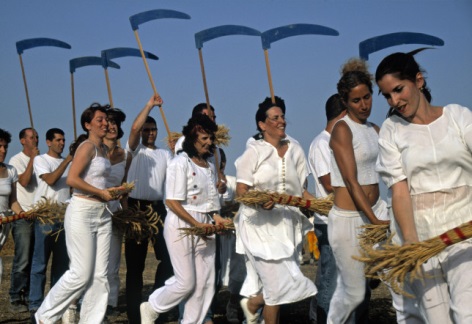
A jubilant Shavuot celebration using props to symbolise the beginning of the Land of Israel’s wheat harvest
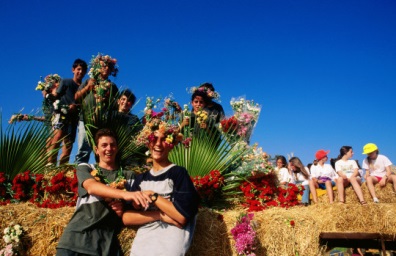
Flowers and greenery are key to the event’s symbolism (Shavuot)
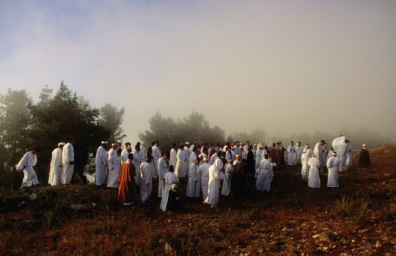
Shavuot celebrations in Nablus in the West Bank, Palestine
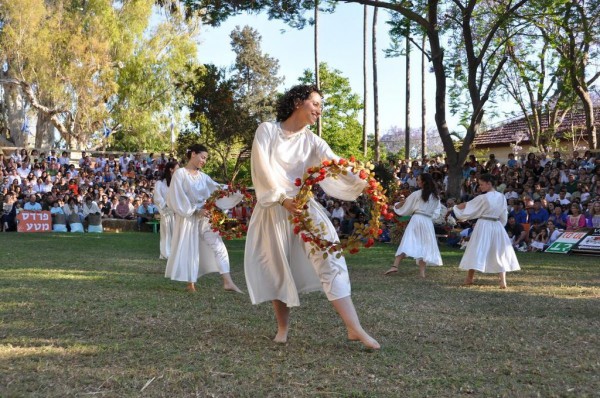
Shavuot, Kibbutz Gan-Shmuel, Israel
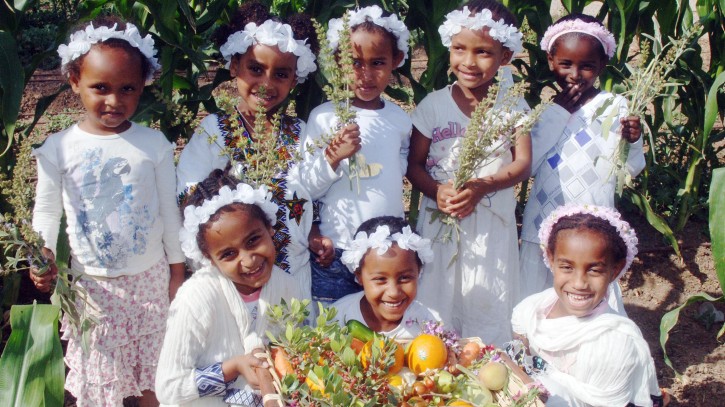
Ethiopian Israeli girls dressed in traditional white dresses hold a basket of fruits and vegetables as they stand in a field, ahead of the upcoming Jewish holiday of Shavuot
The Shavuot Ceremony in Moshav Bilu, Israel on 2014.06.04
Shavuot First-Fruits/Twin Loaves Reenactment


